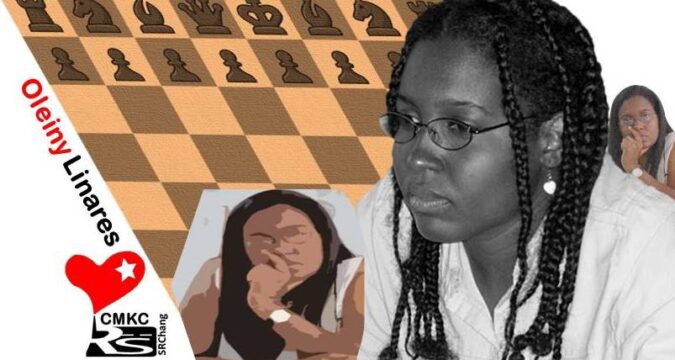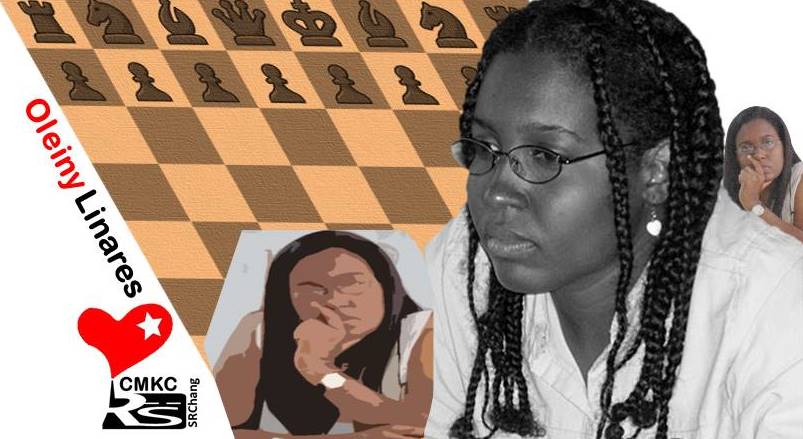

Oleiny Linares- GM Oleiny Linares closed her performance in the National Women’s Chess Championship Camagüey 2023 with a victory over WIM Yoana González, from Havana and proclaimed herself queen of Cuban women’s chess for the fourth time.
Oleiny finished the tournament with 8.5 points as a result of six wins and five draws and relegated to second place Lisandra Ordaz, who finished with 8 units after she lost on the closing day, after having remained on top for much of the competition.
With this performance, the experienced player from Santiago de Cuba, who had already won the national championship in 2010, 2016 and 2019, conquered the title in possession by her colleague Yaniela Forgas and added 54.8 units to her Elo coefficient. The third place of the event was for WGM Yerisbel Miranda, from Pinar del Río, after negotiating a quick armistice with WFM Amanda Muñiz from Villa Clara in the farewell round to finish with 7 points, half a unit ahead of Forgas, who occupied the fourth place.
Oleiny Linares: Active chess player. Panamerican University Champion. Selected among the 10 best athletes of the year 2010 in Cuba and among the 10 best of the year in the province of Santiago de Cuba. She holds the title of Grandmaster.
Born on June 27, 1983. She lives in Santiago de Cuba. In 1989, she began her elementary studies at the “Maurice Bishop” Semi-boarding School. In 1996, she began her junior high school studies at the “Luis Manuel Pozo Nápoles” School until 1997 when she moved to “Captain Orestes Acosta” special sports center due to her sports results.
In 1999, she continued in different special sports centers. In 2009 she got her BA in Physical Culture at the “Manuel Fajardo” University of Physical Culture and Sports Sciences in Santiago de Cuba.

Oleiny Linares Napoles (born 9 May 1983), is a Cuban Woman Grandmaster (WIM) chess player.[1][2][3]
She was the champion of women’s chess Cuba in February 2010 and runner-up in 2011, and was the winner of the Cuba junior women’s championship in 2003. She won in the Pan-American University Tournament in 2009 and participated representing Cuba in the Chess Olympiad twice, in the years 2008 and 2010.
If one goes to Cuba and visits the Capablanca Chess Club, one will find enthusiastic players engaging in blitz sessions and intense analysis of games. The players are very passionate, have a good standard and many strong players claim roots at the club. Because of this chess culture Cuba has developed into a chess power and is currently ranked #19 in the world… second to the U.S. in the western hemisphere. Leinier Domínguez is the top-rated player while the top-rated female player currently is Oleiny Linares Nápoles, winner of silver medal at Dresden Olympiad. Perhaps the Spanish name “Linares” is now known for more than the defunct super-GM tournament.
Born in the region of Santiago de Cuba in 1983, Linares hails from the same region of the great Afro-Cuban revolutionary, Lt. General José Antonio de la Caridad Maceo y Grajales… or simply Antonio Maceo. It is also the place where national hero Jose Marti is buried and incidentally Linares lives in the district bearing his name. There are a large number of Afro-Cubans in the city of Santiago de Cuba and Linares is one “Santiaguera” who has shined on the chess scene. Born June 27th, 1983 in Santiago she is a veteran of three Olympiad tournaments and has won several national titles. She earned the Women FIDE Master (WFM) title in 2000.
At the 2008 Dresden Olympiad, she rose to international prominence by scoring 9/10 (+8-0=2) and earning both a silver medal and the WIM title. In 2010, Linares became the women’s Cuban national champion and would help the team score a splendid result in the Olympiad in Khanty-Mansiysk. Cuban women achieved their highest ranking ever of 4th after wins over Latvia and Croatia. Linares would score 5.5/9 on second board and later be awarded the WGM title.
In 2012, Cuba was unable to repeat the success of the previous Olympiad and came in 19th despite only two losses. Both Linares (who was pregnant) and Lisandra Ordaz Valdes scored 6/10 at the 2012 Istanbul Olympiad (Linares on board #3). She won Havana’s Concluyó la Copa Giraldilla with 6.5/9. In this year’s women’s national championship, she came in joint 4th with the legendary WGM Maritza Arribas winning her 10th title.
In March of this year, Linares competed in the Capablanca Memorial, the annual tournament that attracts some of the world elite including Vassily Ivanchuk. The tournament is comprised of two sections: the Elite section, a near-2700 level tournament and the Premier section which is comprised of strong master-level players. While Hungarian Grandmaster Zoltan Almasi won the Elite section with 6.5/9, Linares won the Premier section with 7/9 with superior tiebreaks over IM Carlos Davila. In doing so, she scored a second IM-norm and it confirms the fact that women competing in the strongest available fields can yield good results.
Linares winning 1st at the 2013 Capablanca Memorial.

Oleiny Linares, Queen of National Championship for the Fourth Time
Linares can be considered one of the strongest players of African ancestry (male or female), but most certainly the strongest woman. It goes without saying that the success of this talented Afro-Cuban woman should not go unnoticed despite the lack of exposure Cuba gets in the mainstream western media. In addition, it is noted that her success should encourage women to come out of the comfort of playing solely in women’s tournaments since there are no limitations that would normally occur if brute strength were required.
A proud mother of two daughters (Mirtha Esther and Faith Victoria) with a supportive husband, she represents all that is good about chess and provides inspiration for those who may believe there are limitations of race and gender in the chess realm. Cuba is a country of intrigue and nostalgic beauty. It is a country with a complex geopolitical and sociocultural landscape, yet it is a country presenting many examples of resourcefulness and opportunism.
Rogelio Ortega is a name Linares must surely know. As the 1958 and 1966 national champion of Cuba, he served as a trailblazer in times where master-level players of African descent were rare. Ortega traveled the world competing against legends like Semyon Furman, Saloman Flohr, Max Euwe, Wolfang Uhlmann and Vlastmil Hort. Despite the height of Cuba-U.S. political tension, he traveled to the U.S. to play in the 1959 U.S. Open. He is honored by a memorial tournament in Cuba every year.
The aforementioned Afro-Cuban Antonio Maceo is honored on the Cuban peso and considered a national hero. More than 100 years later, we find another Afro-Cuban from the same city serving not as a soldier, but an ambassador of a sport that ofttimes is very exclusive. It is with such an example that Oleiny Linares Nápoles can continue her quest for excellence in chess and help present a picture of chess that is universal and more inclusive.
Oleiny Linares vs Colombia
One of the art forms that is highly revered in Cuba is chess. With a rich tradition stemming from the world championship of José Raúl Capablanca, chess has become fully integrated as a national pastime.























